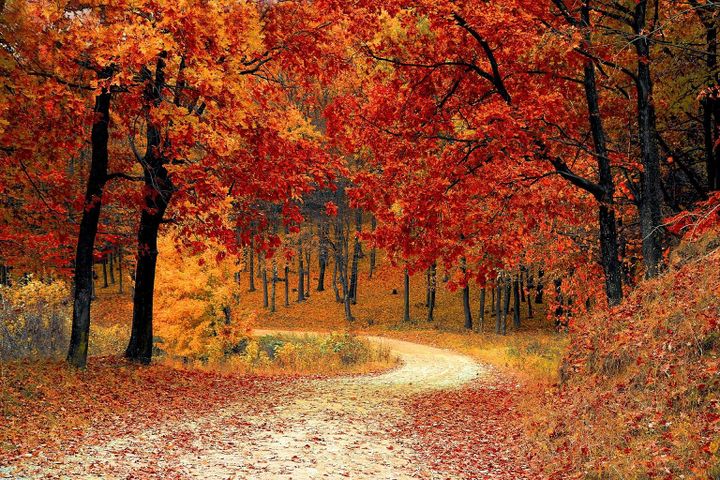Fall Weather and Humidifiers...Click here to learn more!!

Fall Weather and Humidifiers
It's the changing of the seasons, something many of us in New Jersey and the surrounding areas, have been eagerly waiting for. But it's important to remember that more comes with the fall than cooler weather. An inescapable consequence of colder weather is dryer weather. The creeks and lakes are lower now than they have been in months and that's not the only result from this dryer weather, a trait that will only intensify as we move farther into the cold of winter.
So, what is one to do about this dry weather, and how does it affect our daily lives anyway? That's what this tip of the day will be about. We’ll take a look at the consequences of dry weather on your health, home, and HVAC system. We’ll look at how heating in actually can make the problem worse. And we’ll see how humidifiers can solve these problems. Humidifiers can be mighty handy devices in these cold months. Read on to learn the why’s and the how’s of humidifiers and their usefulness in the fall.
Perfect Storm of Dryness
You see, humidity drops as temperatures cool off, and cold fronts start to move in. It’s a fact. And this fact is further developed with the exact same thing we use to combat these cold fronts, our heating systems. Furnaces may keep us warm and cozy by raising the temperatures in our households when it’s chilly outside, but they have another consequence; they too dry out the air.
So, to recap, you have colder weather, which naturally comes with less humidity than our sticky summers. And then you have the heaters we use to counteract this cold weather drying up the air in our homes even further.
This isn't even to mention fall allergies, which can intensify the same effects many feel from overly dry air in the home. Have you noticed a runny or stuffy nose lately? How about watery or itchy eyes? You may think only spring time with its blooming trees and flowers is the cause of your allergies, and you'd be right. But, many of those same symptoms can show up in the fall and allergy sufferers will be miserable.
Changes in season or just changes in the weather can bring about dry air that can make you have nosebleeds, headaches, itchy skin, and red eyes. Minimizing the ill effects of dry air will make your home more comfortable. Seasonal humidity levels can affect home comfort.
In comes humidifiers. Even if you are not bothered by the dryness of the air during the day, you may notice you sleep better using a humidifier.
On top of allergies, there’s also flu season. Have you gotten your flu shot yet? Even if you have, you could still develop a cold or catch a new strain of influenza, and the resulting symptoms can leave you miserable for days. Dry air compounds your misery because it dries out your sinuses, throat, and nose. That’s why you might feel better after you take a hot shower or breathe in steam from a mug of tea.
You don’t have to spend your entire illness in the shower or with a cup of tea cradled in your hands, though. A humidifier increases humidity levels throughout your home, which eases your symptoms and helps you breathe easier. While you can buy a portable humidifier for a single room, we recommend whole-home humidifiers because they’re more efficient, and they don’t require human intervention. They become part of your HVAC system, just like your air conditioner and furnace. Let’s look at some more benefits of adding a humidifier to your heating.
Benefits of a Humidifier in the Fall
So we’ve touched upon some of the basic factors that explain the utility and usefulness of a humidifier. And these essentials revolve around the fact that dry air in the home can lead to a number of health effects and discomfort. A humidifier solves this by introducing moisture into the air so that your home can reach the equilibrium needed to maximize indoor air quality.
But it goes beyond that. Ideally, you want the relative humidity in your home to be in the range of about 30% to 50%. For a lot of us, the summertime problem is keeping the relative humidity low enough, but it's the opposite in wintertime, even in humid climates.
Humidity has a big effect on sleep quality as well. Sleeping in a home with dry air can reduce the quality of your sleep, thanks to uncomfortable symptoms like a sore throat, congestion and nosebleeds. If you’re struggling to breathe in your sleep, you might start to snore and interrupt other people.
Nosebleeds at night cause you to wake up frequently, disturbing the rest cycle. Congestion and blood in the nasal passages can run down your throat while you sleep. This can lead to nausea and stomach discomfort. While a humidifier won’t eliminate these symptoms if you’re sick with a cold or allergies, it’ll add moisture to the air and reduce the dryness that can cause uncomfortable health symptoms.
There are ways a humidifier can help beyond health and comfort though. For example, there’s the matter of energy savings. Have you ever wondered why a home can feel nippy even though the heated temperature should be adequate? Dry air feels cooler than optimally humidified air. This is due to the fact that dry air removes moisture from the skin more quickly, which is how bodies cool down. Maintaining optimal humidity levels will help you to feel warmer and more comfortable.
Using a humidifier will allow you to increase the thermostat setting a few degrees and still feel comfortable, in addition to saving on heating costs. Some furnace types can decrease indoor humidity. In such cases, using the furnace less, has a positive impact on maintaining ideal home humidity levels too.
Not to mention, your house itself, and your HVAC system will benefit from properly humidified air in the fall and winter. Dry air degrades the quality of porous building structures, furnishings and possessions. Dry indoor air can slit and crack wood flooring, dry out cabinetry, musical instruments, photographs and more. When the cooling months arrive and humidity rises above ideal conditions, these same porous objects absorb moisture and swell. This fluctuation causes more harm. Maintaining ideal indoor humidity during the heating months helps to alleviate these issues.
Whole House Humidifiers
Here’s the thing, the next question to ask, after coming to the conclusion that your home could benefit greatly from the addition of a humidifier, is, what kind of humidifier to get? There is of course the option of getting a small, portable, room humidifier, but if you’re noticing signs throughout your home of the negative effects of low humidity in the fall, you may want to invest in a whole house humidifier, sometimes referred to as a central humidifier.
Let’s define these terms in greater detail. A humidifier is a piece of equipment that moisturizes the air with water vapor. Oftentimes, these devices come in portable, tabletop, or console models, allowing them to humidify a single room or area. However, a central humidifier is hardwired into to your home’s heating and air conditioning unit and then hooked up to the house’s plumbing. So instead of only working on a particular point of use (bedroom, kitchen, or bathroom), these permanent installations humidify the entire house at once, making them extremely efficient in terms of efficacy, conservation, and financial savings.
This has a whole range of benefits and advantages over your traditional portable humidifier. First off, most homes dry out due to their heating and cooling systems. The blasting air of heating or air conditioning can really dehydrate a house. But a central humidifier catches the culprit right at the source by moisturizing air as it leaves your HVAC system. Also, compared to portable units, it doesn’t require much maintenance. You won’t have to refill the water supply since it’s tied directly into your plumbing. Plus, since they don’t use a supply tank of standing water like console models, there is less chance for bacteria buildup which can then spread into the air.
Portable units may be less expensive upfront, but the electricity and water they waste ends up costing you in the long run. And they’re a bit of a hassle: you have to walk around them, they can sometimes spill and sweat, and if you have a steam unit they can often be dangerous to passing children or pets. Whereas a central air humidifier is out of sight and only functions when needed.
So if you do find your home and family members are suffering from the effects of this dry fall, consider a humidifier, and consider a central humidifier. It’s the best investment for controlling the moisture levels in your home.
Stay comfortable this fall and upcoming winter season with the right equipment for keeping your home in a perfect balance of temperature and humidity. This can be achieved via a central humidifier attached to your HVAC system. You’ll notice the benefits right away!
Call ADE Heating and Cooling today, for all of your HVAC needs!! 609-693-6050
NJ Master HVACR Lic # 19HC00400200
NJ Master HVACR Lic # 19HC00136200
NJ Master Plumbing Lic # 36B100668500
About the Business
Have a question? Ask the experts!
Send your question

